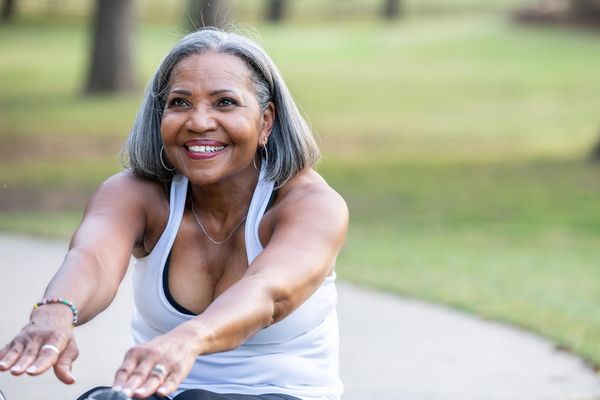Relationships are hard. Forming a close connection with another person while navigating choices around dating, sex and family planning can be tough for anyone. But add inflammatory bowel disease (IBD) into the mix, and things get extra complicated.
Characterized by chronic inflammation of the gastrointestinal tract, IBD is an umbrella term that includes Crohn's disease and ulcerative colitis. While they may affect different parts of the gastrointestinal tract, these two diseases share symptoms like chronic diarrhea, abdominal pain, weight loss and fatigue. Another thing they have in common? Their impact on relationships, sex and fertility.
IBD symptoms make dating daunting
Whether you're looking for a life partner or something more casual, dating is the typical path to a relationship. But the physical and emotional toll of IBD may make dating difficult. "Most women are diagnosed with IBD before they are 40 years old, which is prime dating time for many," said Dr. Heather Bartos, an OB-GYN and a member of HealthyWomen's Women's Health Advisory Council.
Maintaining a healthy body image can be hard for people with IBD. This is especially true for women, who are more likely than men with the disease to experience problems with body image. "Some of the medications, including steroid treatments, can cause physical changes such as weight gain, stretch marks from rapid weight gain and mood changes," Bartos said. She points out that diarrhea and other IBD symptoms often trigger self-esteem issues.
Bartos adds that IBD can sometimes require surgeries like colostomies and bowel resections that can further damage body image and self-esteem.
Fatigue is another symptom of IBS that can make dating hard, since many people may simply be too exhausted to even think about going on a date. In one study, 41% of patients with IBD said they experienced fatigue to the point that it disrupted their lives.
Mental health challenges also play a big role when it comes to dating with IBD. A significant proportion of people with IBD suffer from depression and/or anxiety, which can lead them to isolate themselves instead of seeking companionship. It's hard to put yourself out there when you feel insecure and unwell.
Talking about IBD can be awkward
For people with IBD who have progressed from dating to a relationship, the next hurdle might involve telling their partner about their disease. It can be awkward to bring up health issues during the early stages of a relationship, especially when those issues involve potentially embarrassing symptoms.
If you have IBD and are unsure how to bring it up, consider looking to others with your condition for help. A support group of people with IBD can offer advice and encouragement, guiding you on how to have hard conversations based on their own experiences. Being part of a group like this also reminds you that you're not alone.
When you do decide to open up about your IBD, you might find that it strengthens your relationship. Sharing something so personal can help create emotional intimacy in your relationship, which can lead to greater physical intimacy.
IBD affects sexual health
OK, you've shared the fact that you have IBD with your partner, and you're ready to get even closer. Or are you? While most people with IBD are physically capable of having sex, the disease can get in the way of sexual relationships.
In one review of over 50 studies, about 35% to 58% of people reported impaired sexual functioning because of their IBD. Just as with body image issues, women are more likely than men to experience sexual dysfunction related to IBD. This includes lack of interest in sex, having sex less frequently and lower sexual satisfaction.
The effects of IBD on a person's sex life can be related to physical symptoms of the disease like pain and fatigue, as well as psychological ones like negative body image and anxiety. "I think most women are scared of being judged sexually," Bartos said. Having IBD only adds to that fear.
Fertility, family planning and IBD
When it comes to family planning, couples need to take IBD into consideration. While there is no evidence that IBD affects fertility when the disease is inactive, side effects like low sex drive, chronic abdominal pain, depression and anxiety can lead to an increase in infertility.
If you and your partner decide to conceive, you'll want to talk to your healthcare provider first. Women with IBD that experience symptoms of their disease during pregnancy tend to have worse outcomes like miscarriage and low birth weight than those without the disease, and certain medications used to treat the IBD symptoms may not be advised during pregnancy.
Building confidence and feeling sexy with IBD
According to Bartos, one of the best ways to embrace your sexuality with IBD is to give yourself permission to seek pleasure — and to feel it. "Many women who struggle with a chronic disease tend to hide themselves away, as if they aren't worthy any longer of a fantastic sex life," Bartos said. "But that's just not true."
As far as boosting confidence, Bartos suggests seeking out role models who are proudly displaying their symptoms and owning their IBD. She also recommends keeping track of what's going on with your body and how you're feeling about it to help you better understand your disease and, ultimately, yourself.
When it comes to dating with IBD, Bartos believes practice makes perfect. "I think every woman before going on a date puts on a suit of armor, because you never know if this new date is going to be a jerk or not," she said. "One of the best treatments for this embarrassment or nervousness or fear of dating is to go on a lot of dates."
Above all else, Bartos says to avoid wasting time on people who dismiss your disease. "If they can't accept the IBD, they can't accept you, and I'd drop them like a hot potato!"
This resource was created with support from Ferring Pharmaceuticals and Medtronic.
- How I Discovered Gratitude While Living with Inflammatory Bowel Disease ›
- Inflammatory Bowel Disease and Your Sex Life ›
- How to Prevent Inflammatory Bowel Disease Symptoms from Controlling Your Life ›
- How to Support Someone With Inflammatory Bowel Disease (IBD) - HealthyWomen ›
- Social and Emotional Effects of Life With Inflammatory Bowel Disease (IBD) - HealthyWomen ›
- Fast Facts: What You Need to Know About Inflammatory Bowel Disease - HealthyWomen ›







